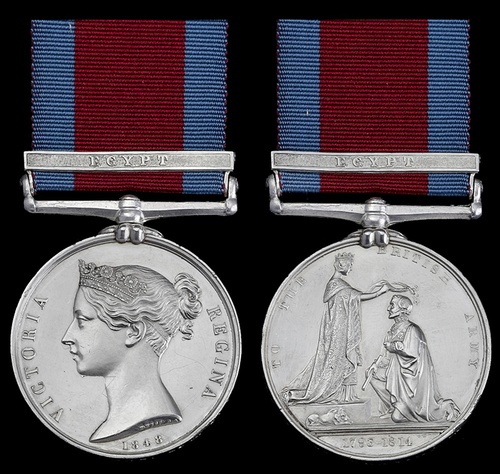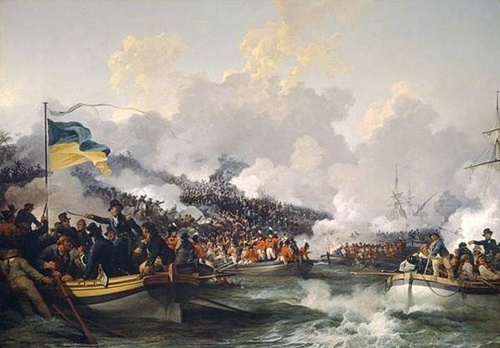Auction: 18003 - Orders, Decorations and Medals
Lot: 1
The Property of a Gentleman
AN OLD COLLECTION OF PENINSULAR WAR AND WATERLOO MEDALS
Military General Service 1793-1814, 1 clasp, Egypt (T. Chivers, 40th Foot.), '40th' officially corrected and some scratches near claw, better than very fine
One of 25 'Egypt' clasps awarded to the 40th Foot.
Provenance:
Spink, June 1987.
Thomas Chivers served in Egypt in 1801 as a Private with the 40th (2nd Somersetshire) Regiment of Foot. Two years earlier, Napoleon's hopes of conquest were dashed by Admiral Sir Sidney Smith's unyielding defence of Acre (see Strathern 2008, 340 f.). Not for the last time, Napoleon showed his willingness to abandon his army, returning to Paris on 16 October 1799. Exhausted and plague-stricken, some 21,000 French troops remained in Egypt under the command of General Jean-Baptiste Kléber.
Determined to eliminate any threat to India, in February 1801 Britain sent an expeditionary force of 17,000 men under General Sir Ralph Abercrombie to evict the French from Egypt. The East India Company meanwhile ordered General Baird, hero of Seringapatam, to seize Kosseir on the Red Sea with 5,000 men. While Baird marched down the Nile, Abercrombie landed his troops - including the 40th Foot - at Aboukir on 8 March. Opposing him on the beach were 2,000 French infantry and ten guns. During the landing, fifty British soldiers were packed onto each transport vessel, making them easy targets for French artillery. Despite heavy gales causing severe delays, the British troops landed with fixed bayonets and routed the French defenders. British losses amounted to 130 killed and 600 wounded or missing.
On 21 March, Abercrombie fought a pitched battle outside Alexandria, on the thin isthmus separating Lake Mareotis from the sea. At 4 a.m., the French attacked the British right flank under Sir John Moore. In the darkness, a French column penetrated between two British regiments and encircled the 28th Foot. The 40th Foot counter-attacked and drove the enemy back in confusion, but were obliged to form square against repeated cavalry charges. Abercrombie took a musket-ball in the thigh; carried aboard H.M.S. Foudroyant, he died of septicaemia seven days later. A British victory was nevertheless secured, although Alexandria's garrison held out until 2 September. The 40th Foot sailed home the following month. Britain repatriated all French prisoners (Strathern 2008, 418), but kept the Rosetta Stone.
Recommended reading:
Strathern, P., Napoleon in Egypt (London, 2008).
Subject to 20% VAT on Buyer’s Premium. For more information please view Terms and Conditions for Buyers.
Sold for
£1,500







